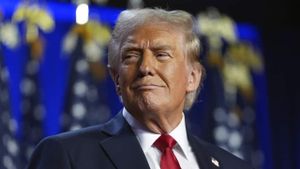On November 1, 2024, Botswana witnessed a historic political upheaval as the ruling party, the Botswana Democratic Party (BDP), conceded defeat after nearly 60 years in power, marking the end of its long-standing dominance. The unexpected turn of events unfolded as voters expressed their dissatisfaction with the economic stagnation fueled by declines in the diamond trade, leading to the election of Duma Boko, the candidate from the opposition coalition known as the Umbrella for Democratic Change (UDC).
The electoral results were staggering. Analysts indicated the BDP faced mounting grievances, predominantly from younger demographics, exacerbated by rising unemployment rates and stagnant economic growth. With Botswana’s economy having heavily relied on diamond exports, the recent downturn had left many disillusioned.
With 58 years of governance under the BDP since Botswana's independence from Britain, this election signified not just unrest but also the voters’ demand for fresh leadership. President Mokgweetsi Masisi, having recognized the landslide nature of the results, conveyed his acknowledgment of defeat through social media, stating, "From tomorrow... I will start the process of handover.” This indicated both grace and readiness for transition as he prepared to extend power to his successor.
Duma Boko, 54, immediately addressed the nation upon learning of his victory, asserting his determination to fulfill the high expectations placed upon him. “I pledge with every fibre of my being... I will do everything I can, not to fail, not to disappoint,” he declared, showcasing his commitment to the people’s needs and wellbeing.
But why such widespread dissatisfaction? Over the years, Botswana's economy, once thriving thanks to its diamond wealth, faced severe challenges. The diamond sector had encountered heightened competition and declining revenues, leading the government, which retains significant stakes in diamond mining through companies like De Beers, to pivot strategies to secure the economic fabric.
This electoral shift denotes not merely political change but reflects voters’ demands for innovative policy proposals aimed at addressing welfare, economic reform, and creating job opportunities. Commentators noted how the UDC’s ambitious promises – including the proposal to double the minimum wage and reform social services – attracted significant support among disaffected youth.
Polling showed the UDC gained substantial traction with voters and secured 35 parliamentary seats based on results from 58 of 61 constituencies. This demonstrated not just preference for change, but also dissatisfaction with the BDP’s lack of new ideas and solutions. Political analyst Ringisai Chikohomero emphasized, "After 58 years in power, the BDP didn’t have anything new to offer." Accordingly, the BDP found itself struggling for relevance as the UDC's progressive solutions captured public interest.
Gaborone, the capital city, reverberated with celebrations among the UDC’s supporters, signaling both hope and relief across many communities. Young individuals, including 23-year-old student Mpho Mogorosi, expressed their joy and disbelief at witnessing this monumental political shift. "I did not ever think I would witness this change... the BDP had stayed too long," Mogorosi remarked, echoing the sentiments of many first-time voters who actively sought change after decades of BDP rule.
While political analysts highlighted the BDP’s loss as indicative of broader trends affecting ruling parties across southern Africa, economic concerns became the central theme behind this electoral revolution. With Botswana's economy being one of the strongest on the continent – measured by GDP per capita – recent reports estimated the growth rate had tumbled to about 1% due to global market fluctuations.
Boko’s immediate challenge will be rekindling Botswana's economic spark amid uncertainties and inherited grievances. He acknowledged the precarious state of relations with De Beers, stating, “We are an economy reliant on diamonds,” pointing to his plans for dialogue with the mining company to navigate concerns over the future direction of diamond production.
Political scientists suggest the outcome of these elections sends a compelling message to long-dominant parties across the region: without delivering economic growth and employment opportunities, even the most entrenched leadership could falter. Zaynab Hoosen, from Pangea-Risk, remarked the result “should serve as a warning” to any ruling party ignoring economic restraints and public needs.
With Botswana’s new leadership, citizens will be watching closely not only for immediate policy changes but also for substantive efforts to reinvigorate the economy and meet the aspirations of its populace. The stakes remain high, but with fresh promise from the UDC leadership, many are prepared to embrace the uncertainties accompanying this transition.



